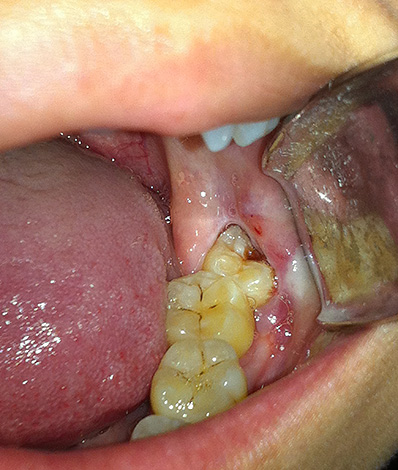
Next you will learn:
- In some cases, wisdom teeth (eights) are better to treat after all than to rush to remove them;
- Why do you need wisdom teeth, and what benefits can they serve you in the future;
- Is it worth treating the eighth tooth if it is badly damaged by caries, and what important nuances should be taken into account;
- In what situations the wisdom tooth should be removed necessarily, and as soon as possible;
- What can be the fate of the eight when developing complications of caries, in particular, with pulpitis and periodontitis;
- And finally, what is the average cost of treatment and removal of a wisdom tooth in a public clinic and in private dentistry ...
Wisdom teeth (eighths) sooner or later erupt in most people, and far from all problems with them arise. Often, eights exit the gums normally, without forming a gingival hood, and then for years regularly perform their chewing function without any signs of carious lesions.
However, this does not always happen - it is not for nothing that wisdom teeth are considered the most problematic. The most common situation is difficult teething of wisdom tooth, then its destruction due to caries follows, and the rating closes its incorrect placement in the jaw, causing injury to the cheek or gum.
The photo below shows a semi-reinforced wisdom tooth (that is, it only partially erupted):
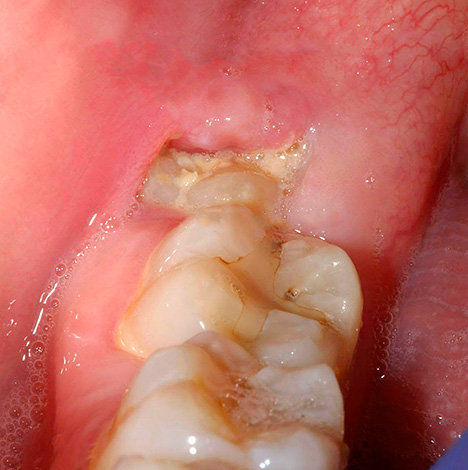
A person suffering from pain in such situations raises a quite reasonable question: is it necessary, in general, to treat these problematic wisdom teeth, or maybe it is better to immediately remove them from a dentist-surgeon, so as not to suffer anymore?
About in which cases wisdom teeth need to be removed, and in what situations it makes sense to treat them, as well as about some problems that may arise in this case - we will talk more about all this in more detail ...
It is interesting
Wisdom teeth still remain a kind of mystery to nature. Today, dentists continue to research related to the study of the features of the eighth teeth: the unusual structure, position in the jaw, teething, treatment, removal, etc.
Wisdom teeth do not have a fixed number of canals and roots, they may not “break through” the gums throughout a person’s life, may grow unevenly and create serious orthodontic problems, leading to malocclusion, may lie horizontally in the bone or even “upside down” ". But often a wisdom tooth can freely and without any obstacles come into the world without causing any inconvenience to a person and performing a useful (chewing) function.
Why do we need wisdom teeth at all, and when can they come in handy
There is an opinion that wisdom teeth are an example of atavism - they came to us from distant ancestors who ate rough food, which, if it was cooked, then without a long heat treatment. To chew it effectively, a large chewing surface was required — large and durable molars, including wisdom teeth.
Compared with the dentition of our ancestors, the arch of modern man has become shorter by an average of 10-12 mm - respectively, the space for eights has become less. The food consumed by human civilization has become softer and more digestible, and, in fact, the need for wisdom teeth, in terms of their functionality, has disappeared.
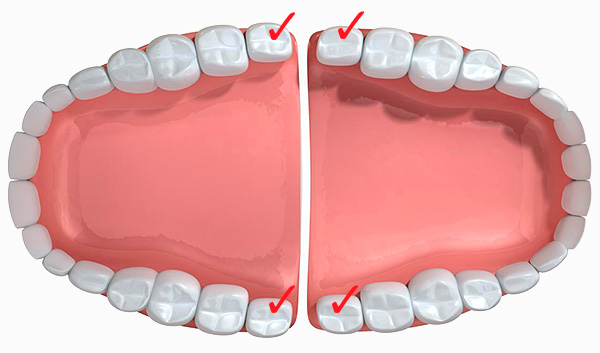
Nevertheless, wisdom teeth can be very useful in the life of most people under two basic conditions:
- They have a pair - that is, the upper and lower eighth teeth on one (or both) sides of the jaw are a pair of antagonists;
- They are not much destroyed by caries and do not have mobility (for example, due to periodontitis) - that is, they can be used in the future as a support for an orthopedic structure (single crown, bridge, under the clasp of a removable prosthesis, etc.).
In the first case, everything is more or less clear: why do we need to remove a wisdom tooth if it functionally meets all the requirements for normal chewing of food. Naturally, in this regard, he does not occupy such leading positions as the 6th and 7th molars, but he makes his contribution regularly and fully.
Regarding the wisdom tooth, as the hope of a promising prosthetics in the elderly, we can say the following: if a large number of teeth on the upper or lower jaw is lost in certain clinical situations, it is precisely the eight that can become an excellent support for the future prosthesis in the broad sense of the word.
An example of using a preserved wisdom tooth as a support for a clasp prosthesis is shown in the photo below:
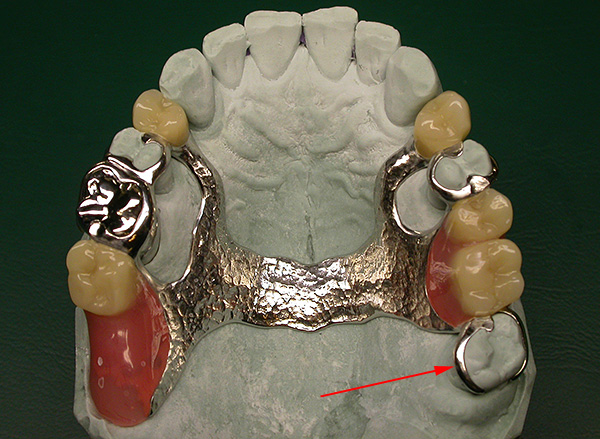
From the practice of the dentist
Often, a wise tooth becomes the last hope for a bridge - then why, one wonders, without a compelling need to pull out a wisdom tooth, which, if important teeth are lost for prosthetics (6 and 7), can become a reliable support for the bridge going from the five (premolar).
Even in the event of some destruction, the wisdom tooth can become a support under the crown, and that, in turn, will serve as a support element for fixing a partial removable denture (clasp, plate, butterfly prosthesis, etc.).
So, as you can see, wisdom teeth need to be protected and, if there are opportunities to heal, and removed only as a last resort, when there are relevant indications for this. However, with respect to the indications for the removal of eights, there are subtleties - let us further consider them. And let's start, perhaps, with the question of the need to remove wisdom teeth with their carious lesions ...
Is it worth treating a wisdom tooth if it is affected by caries, or is it better to remove it immediately?
As a rule, having discovered caries on their own teeth, patients come to dentists who are directly involved in dental treatment (that is, they are undergoing therapy).
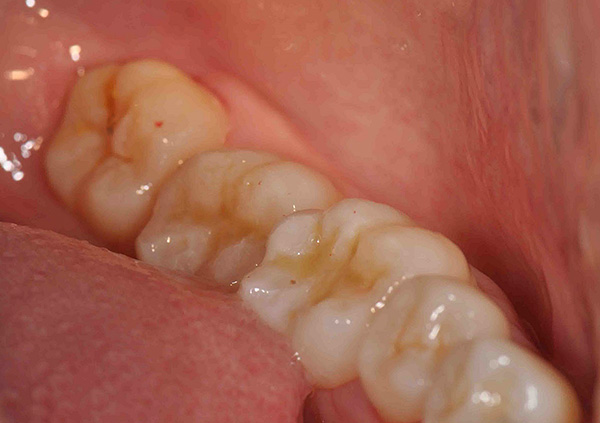
Let's see how the dentist makes a decision about whether it is possible to treat the eighth tooth with caries, or should you already consider removing it, referring it to the dentist surgeon.
Example No. 1: there were no problems with teething wisdom teeth, and it fell into place evenly without injuring the oral mucosa, but foci of caries appeared on its surface (chewing, contact, etc.). In this case, the wisdom tooth does not need to be removed, but it is advisable to treat it as early as possible so that the carious process does not go deeper into the pulp chamber (to the “nerve”).
However, even if the pulp of the tooth is affected and it is no longer about caries, but about pulpitis - even in this case, the wisdom tooth does not need to be rushed at all, it is only necessary to treat the canals and establish a seal. The tooth will be “dead”, but it can last a very, very long time.
The photograph below shows an example of significant carious destruction of a wisdom tooth:
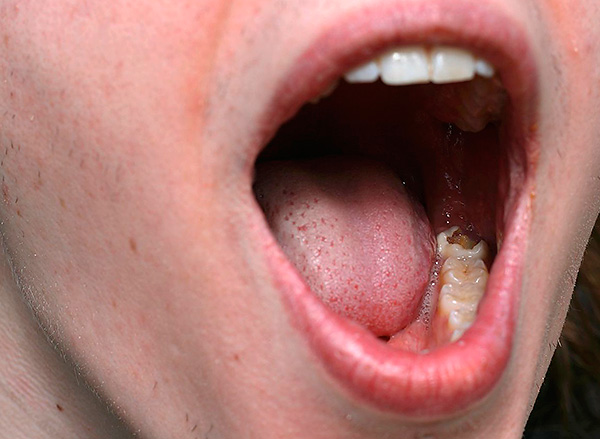
Now we will consider situations when it is not always advisable to treat a wisdom tooth with caries, and sometimes it is better to remove it as soon as possible.
Example No. 2: significant destruction of the wisdom tooth with incomplete eruption. In other words, only a few tubercles of the wisdom tooth appeared above the gum, and the rest of it is under the gum, but serious carious destruction is already observed.
Waiting for the entire wisdom tooth to be on the surface for its full treatment, or, moreover, to endure periodic pains, temperature and swelling when it is difficult to erupt - it makes no sense, this is a vicious practice.Of course, this does not apply to superficial caries, or even average with relative comfort (absence of pericoronitis symptoms). However, monitoring of the situation is also important here, so as not to miss tooth decay to such an extent that it will have to be removed anyway, but against the background of serious complications (periostitis, osteomyelitis, abscess, phlegmon).
Example No. 3: incorrect position of the erupted wisdom tooth in the jaw in the presence of significant carious destruction (including the position that impedes hygiene of the 7th tooth). When a wisdom tooth has a significant deviation from the normal position in the jaw, it can be difficult to ensure its adequate hygiene, as a result of which caries progresses quite quickly, and seven can be involved in the process. In addition, malocclusion as a whole often occurs.
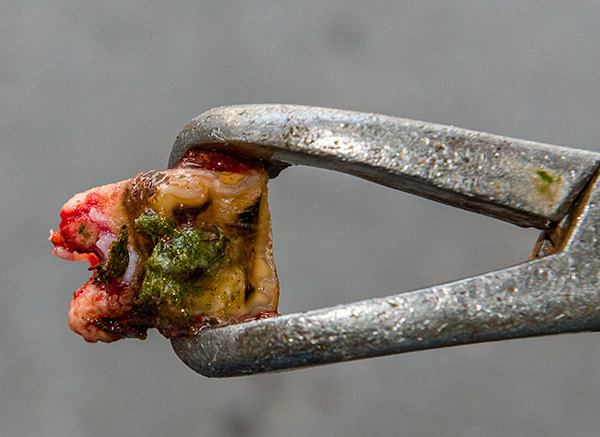
Be that as it may, in practice, each situation is individual, and the doctor decides whether to treat a wisdom tooth or remove it, taking into account the specifics of a particular clinical case.
It is interesting
Even if you made an appointment with a dentist-surgeon to remove a wisdom tooth, it’s not a fact that he will remove it to you. The fact is that dental surgeons are engaged not only in tooth extraction, as is commonly believed, but also in their salvation by performing tooth-preserving operations (and if they are removed, then only if there are clear indications).
If we are not talking about any indifferent doctor in a seedy clinic, then it is the dentist-surgeon who will help you determine exactly whether you need to remove the wisdom tooth right now or you can try to save it.
A few words about the treatment of caries of the eighth teeth
So, if a caries is affected by a normally erupted and properly functioning wisdom tooth, there is no need to rush to remove such a tooth, it is enough to conduct its full treatment.
Almost always, in such cases, the classic preparation of the carious cavity using a drill is used as a preservation technique.
On a note
Modern dental units provide a boron speed of 80-100 thousand revolutions per minute. At this speed, the contact of boron with hard tooth tissues in the absence of forced cooling would lead to strong heating, therefore, air-water cooling of the tip is used.
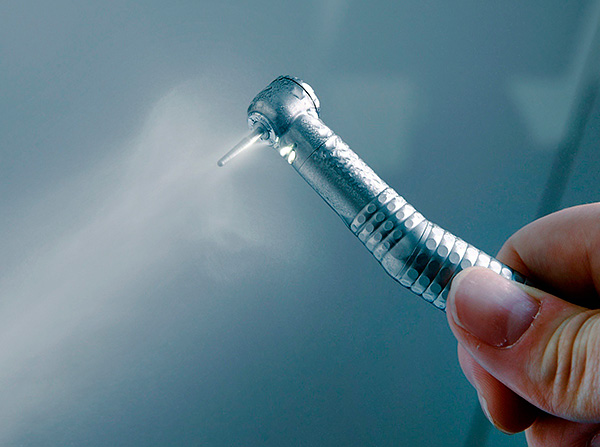
Let's look at a number of popular questions related to the treatment of wisdom teeth affected by caries.
Patient Question # 1: Does Caries on the Wisdom Tooth Hurt?
At the stage of superficial or even medium caries, a wisdom tooth can be treated today absolutely without pain, even without the use of anesthesia. The fact is that during the operation of a handpiece that meets the requirements of 21st century dentistry, there is practically no vibration (as happened before) and tooth overheating, which almost always eliminates the formation of pain. However, in hypersensitive people, as well as in the treatment of deep caries, it is preferable to conduct anesthesia.
Question of patient No. 2: last time when treating caries of the lower wisdom tooth, my face was frozen for 6 hours, is there a milder alternative?
The question is really relevant. Many dentists work according to the old principle: knowing that classical infiltration “near the lower eighth tooth” will not be very effective, they will immediately undergo conduction (torus or mandibular) anesthesia, which determines the duration of “freezing” up to 6-8 hours. That is, the patient for a long time does not feel the cheek, lip, tongue, etc.
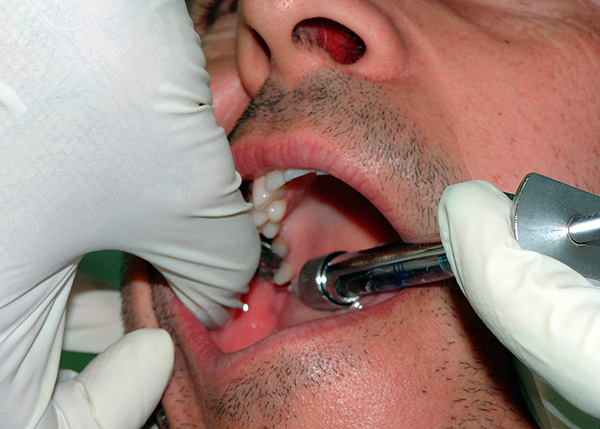
A modern alternative are varieties of infiltration anesthesia - intraligamentary (intraciliary) and intraseptic (intracranial).The amount of anesthetic administered with these techniques is minimal, and if they are strictly observed, the effect is very high: within 40-60 minutes, tooth decay of the wisdom tooth can be completely painlessly cured, and there will be no feeling of “freezing” half of the face. However, not all doctors are fluent in this technique of anesthesia.
The upper wisdom teeth, unlike the lower ones, are perfectly anesthetized by the classical infiltration method: by bringing the solution to the root, which eliminates the phenomenon of prolonged loss of sensitivity of the facial areas. By the way, removing the upper wisdom teeth in most cases is also much easier than lower ones.
Question of patient No. 3: can two wisdom teeth be cured in one visit?
Doctors of the old school may start to scare that decay of two lower teeth at the same time is dangerous to treat because of the same conduction anesthesia on the “face”, which will cause loss of sensitivity of the tongue, can lead to the development of suffocation, etc. Despite the fact that this is a myth, it is preferable to treat two lower teeth with the help of intraligamentary or intraseptic anesthesia (or without anesthesia, if possible). Those who are ready to sit in a chair for more than 2 hours should bear in mind that a professional dentist is able to cure all 4 wisdom teeth in one visit, so two eights is not the limit.
It is interesting
When treating teeth, patients often make a remark that the doctor unnecessarily drills a tooth - they say, he grinds it too long and too hard. Such claims are really perplexing for young doctors.
The fact is that you can “grind” a significant piece of tooth very quickly, in just a couple of minutes. But precisely because of the desire to achieve high quality cleaning from carious tissues, the preparation process is not so fast. Sometimes it takes 5 to 30 minutes to do this painstaking task - in order to minimize the impact of healthy tissues and to clean out the necrotic ones as much as possible.
In what cases is it nevertheless desirable to remove wisdom teeth
Now consider situations where the dentist has the right to recommend removing the wisdom tooth even without signs of carious destruction.
The main indications for removing wisdom teeth:
- A refined or semi-refined tooth (that is, if there are problems when the tooth cannot cut through, or partially cut through). Naturally, each case is individual. A refined wisdom tooth may be under the gum for a long time and not cause concern, just as a semi-refined tooth may be the result of a more or less normal partial eruption of the crown. If there are no symptoms of difficult teething, then there is nothing to worry about, however, with formidable symptoms (edema, severe pain, fever, suppuration from the gums near the tooth), the doctor can decide in favor of removal - and almost always will be right;

- A doped wisdom tooth - that is, when it has taken the wrong position in the jaw. Such teeth do not always need to be removed. If the figure eight cut to the side injures the mucous membrane of the cheek or tongue, then it is necessary to remove it (chronic trauma can lead to the development of malignant tumors). In other cases, options are possible, depending on the situation in the oral cavity as a whole;

- Significant mechanical destruction of the crown of the wisdom tooth (for example, a chip that goes far below the gum) when its restoration with the help of an insert and an artificial crown is not possible;

- The active stage of serious purulent complications in the form of exacerbation of periodontitis, periostitis, osteomyelitis, abscess, phlegmon, etc. (including can be observed after treatment of canals in the wisdom tooth). Regarding the lower teeth of wisdom, procrastination in such a situation - death is similar, so it is necessary to remove it. The lower jaw is massive, the spaces in it are wide, the risks of infection going deep into them are great, even fatal.If we talk about the top eights, then in exceptional cases, you can take on the treatment of exacerbation of periodontitis or incipient periostitis, but in this case it is worth considering all possible risks;

- The impossibility of conservative treatment for one reason or another. It happens that a dentist, taking up the treatment of a wisdom tooth, may be faced with the fact that he cannot continue this treatment - for example, complications arise (a fragment of the instrument in the canal in the absence of equipment for its extraction, perforation of the root, overexpansion of the canal), or the doctor is corny cannot find and (or) along the entire length to process and seal the channels qualitatively. In some such cases, a more qualified, experienced dentist with the right equipment can help, but such experiments always cost a pretty penny, and not every patient can afford it;

- Orthodontic treatment. Today, the tactics of an orthodontist before staging the same bracket systems to remove wisdom teeth, especially those that, when not cut, abut against neighboring sevens, as if pushing the entire dentition, has gained popularity. Studies have shown that this is justified, since the success of correcting the bite while maintaining interfering wisdom teeth is doubtful. However, removing eights when installing braces is not always necessary.

Is it necessary to remove the wisdom tooth in case of hygiene of the 7th tooth?
It has already been noted above that in such cases, wisdom teeth are sometimes actually removed. However, at the moment this issue is considered controversial: a number of experts believe that it is worth removing, since in practice the 7 tooth walls destroyed by caries are often found adjacent to the wisdom tooth. Others believe that the seventh tooth can always be cured if it suddenly becomes ill, but at the same time, the figure eight, even with insufficient hygiene, can serve a person for many years before it makes itself felt.
Is it necessary to treat caries complications in promising wisdom teeth?
If the tooth is not treated in time at the stage of carious decay, then complications of caries develop later - pulpitis, and then periodontitis. Will the treatment of the channels of the wisdom tooth be promising in such cases?
Let's start with pulpitis, as one of the most common diagnosis at the dentist's appointment.
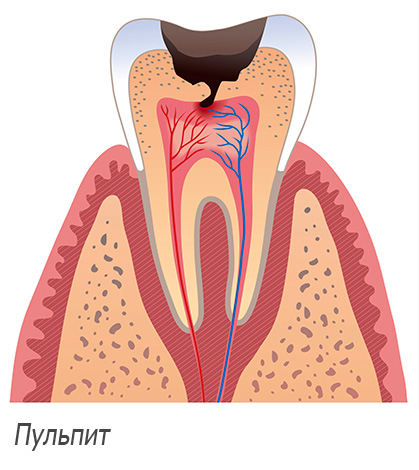
On a note
Pulpitis is an inflammation of the neurovascular bundle (“nerve”) inside the tooth, when this tissue, despite the onset of the inflammatory process, is still very poor, but still alive.
If it was not a wisdom tooth, then any dentist would say with confidence that there is no need to remove the tooth, it is enough to treat the canals. However, the wisdom tooth, unlike the others, has an unpredictable number of channels, its roots are often bent, and access to comfortable and high-quality treatment is most often difficult (especially when treating the upper eights). In the conditions of an ordinary state clinic, it is not always possible to treat such a tooth qualitatively, and complications may arise in the future.
At the same time, in business-class dental clinics, high-quality endodontic treatment is possible with pulpitis of almost any, even the most unusual wisdom tooth in structure - with the control of processes on the image, using a dental microscope, ultrasound equipment, apex locator and other auxiliary devices. However, the price of this service will be considerable.
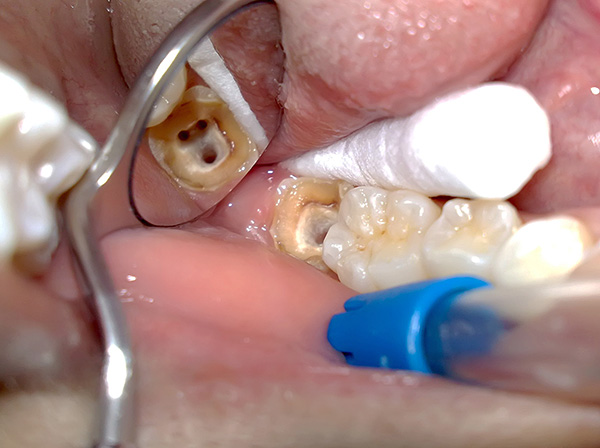
On a note
It is believed that there are no "impassable" canals of teeth - but there is a lack of good specialists and the necessary equipment. That is, if the doctor hints at the removal of the eight and says that with pulpitis, the wisdom tooth cannot be cured, because it has curved or narrow channels, then we can only state that either the clinic does not have the appropriate equipment, or the doctor is not experienced enough .
If you have a strong desire to save a wisdom tooth from removal, then it is best to get a consultation with 2-3 doctors. If 2-3 doctors tell you to remove the wisdom tooth, and the sooner the better, then this should be done.
When the inflammatory process in the pulp chamber goes far, the pulp dies, and we are already talking about the diagnosis of periodontitis. In this case, the doctor considers the advisability of preserving the tooth from the point of view of the risk to the patient’s health - depending on the form and stage of the process, it is possible to begin treatment of canals in acute forms and in chronic fibrous periodontitis.
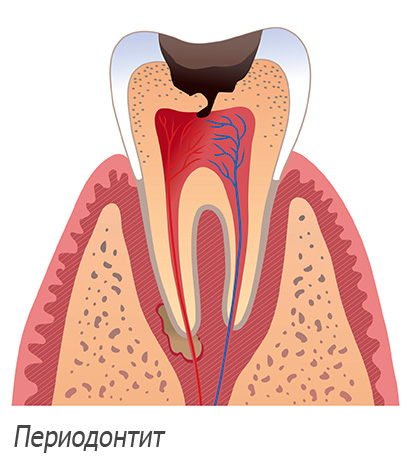
If we are talking about granulomas, cystogranulomas, cysts, then most often the wisdom tooth is removed “away from sin”, although sometimes tooth-preserving methods can be selected according to indications. Here it is up to the doctor to decide and take responsibility.
The photograph below shows the extracted tooth with cysts on the roots:
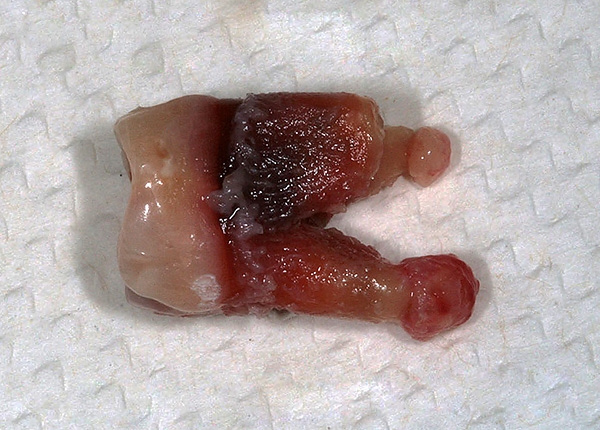
On a note
Periodontitis periodontitis - discord. In acute forms (especially in the serous stage), as well as in chronic fibrous and granulating periodontitis, the ability to save a wisdom tooth is significantly higher than with granulomatous periodontitis. In general, the words “granuloma”, “cystogranuloma” and “cyst” should warn you that the treatment may not be completely successful, or the doctor will immediately suggest removing the wisdom tooth, and this will almost always be a justified decision.
How much can the treatment and removal of wisdom teeth cost?
Now that you already have a general idea of where it is possible to treat, and in which it is preferable to remove wisdom teeth, let's see how much the corresponding procedures can cost and whether it is possible to somehow save.
So, if you conduct treatment in a public institution at the place of residence (hospital, clinic), then you can almost always save significantly, but get far from the best quality service. Removing a wisdom tooth is an extreme measure, and in the same hospital they can remove it almost for free under the so-called “Cricain” (in the language of dental surgeons, this means that anesthesia does not work, and the patient literally screams from pain). At the same time, there is also a great risk that not completely removed tooth roots will remain in the hole - the doctor has too little time for one patient to pay due attention to all important points.
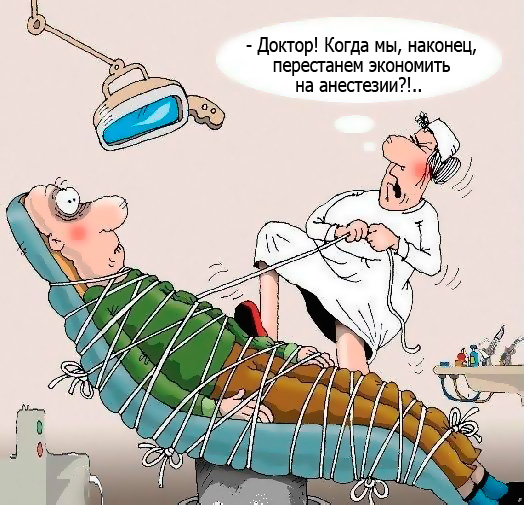
As for the removal of a wisdom tooth in private dentistry, it will cost significantly more than in a state clinic. The upper wisdom teeth in 70-80% of cases fall under the statistics of "light" teeth, and after analyzing the image the question of price is solved in the redistribution of 2000 rubles for the removal of one eight.
The lower wisdom teeth, especially those that are refined and semi-refined, can be removed at a high price: from 3 thousand rubles to 8-10 thousand per procedure. In some cases, anesthesia and hospital stay are included in this price.
The treatment of caries on wisdom teeth can come out at a price of 2-3 thousand to 7-8 thousand rubles per tooth. The price of treating the canals of the wisdom tooth largely depends on the number of these canals: if there is only one canal, then about 1000 rubles are usually taken for its endodontic treatment. With an increase in the number of canals (and there may be 4-5 of them), the cost of the endodontic procedures that are carried out increases proportionally.
It should be borne in mind that anesthesia, the use of cofferdam, drugs (drugs) for medical and anti-inflammatory treatment of canals, temporary and permanent fillings, etc. are separately considered (added). As a result, a complete treatment of a wisdom tooth with pulpitis can cost 5-20 thousand rubles, and treatment of periodontitis is charged even higher.
In conclusion, I want to note that for many patients, wisdom teeth are just as important as any other tooth, and they are extremely reluctant to part with them.Meanwhile, there are many such patients who, in case of problems, are not ready to spend time and money on preserving their wisdom teeth, and at the first opportunity remove eights without regret. Be that as it may, the dentist cannot make a decision for you: he can only put emphasis, weighing the pros and cons, but the patient will always have the last word.
Be healthy!
Useful video: when it is desirable to remove a wisdom tooth
An example of the removal of a semi-reinforced wisdom tooth with preliminary sawing it into parts ...

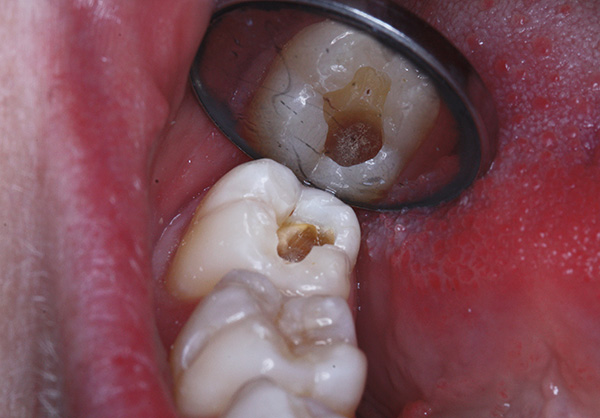
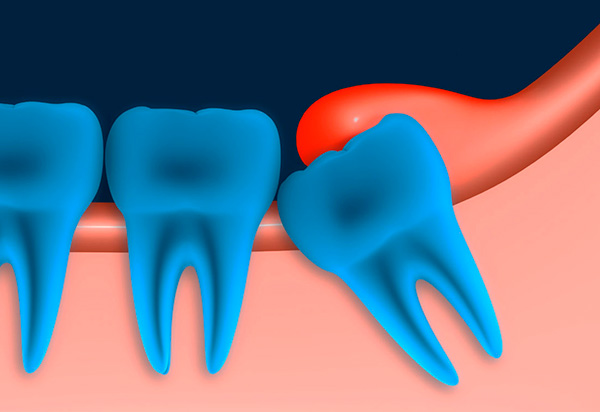
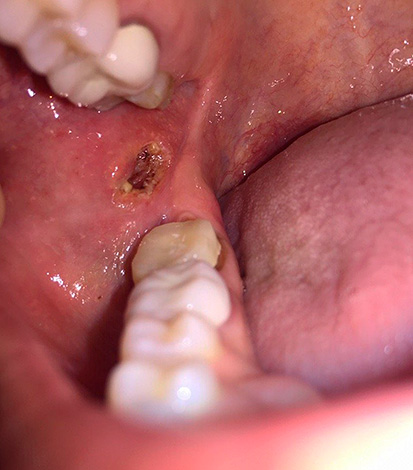
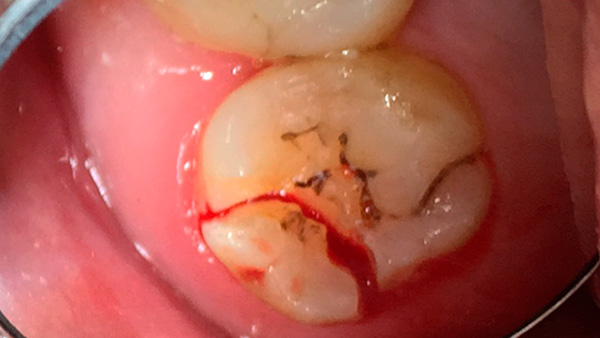
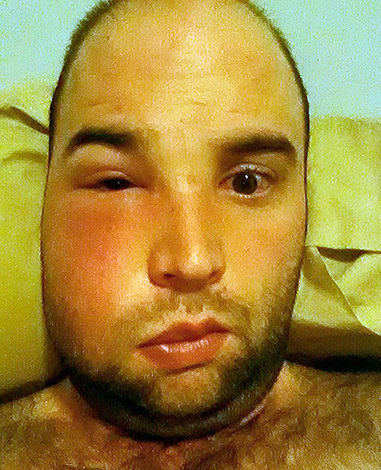
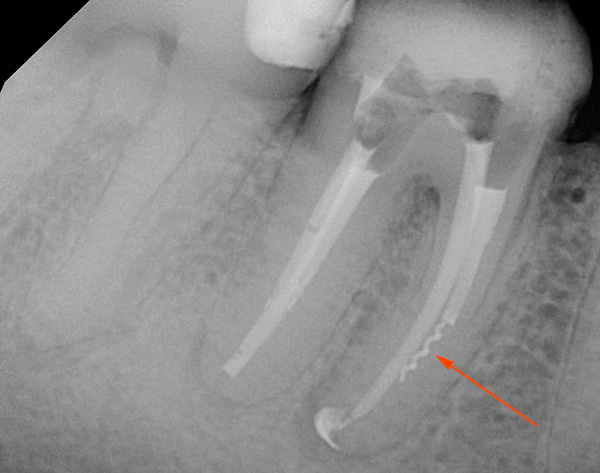
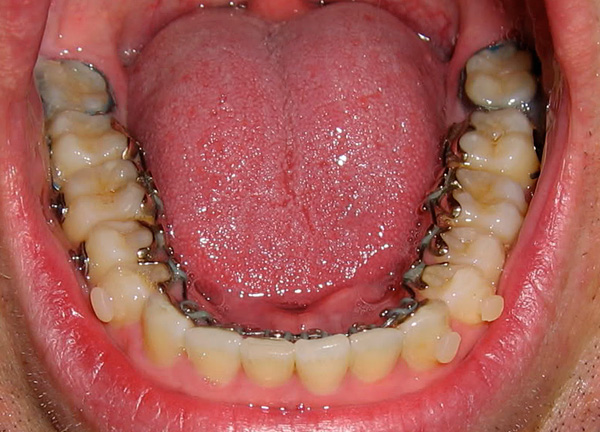
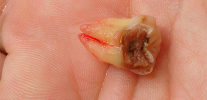
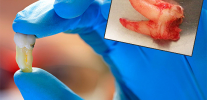
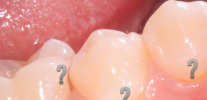
They all say that it doesn’t hurt, etc. Just come. For 10 years, I have never met a doctor who would treat without pain. Alas and ah ... Our medicine is poor. No pain - if only under general anesthesia.
I have a doctor who treats without pain.
The tooth was removed yesterday. Removal taking into account local anesthesia is 12 thousand, and this is not the most expensive and with a 10% discount. And in the article some ridiculous prices are indicated, from 3 to 8 thousand. During the removal, all the buzzes. It only became painful when the anesthesia began to recede, and then it was bearable.
Guys, I'm with you. The tooth hurts after filling the canals. The tooth has been dead for 15 years - and then they managed to mess up.
Hello! Tell me, please - I have a regular headache on the right side of the trigeminal nerve exit points - over the eye, maxillary sinus, teeth. The neurologist and ENT see no problems, they say that a possible reason is a wisdom tooth. Both teeth erupted from this side, the upper came out completely, but began to turn around on the axis, and the bottom 30% is still under the hood. Can wisdom teeth cause such headaches? And which tooth is more likely to blame, upper or lower? The pain is most often felt in the upper row, while teeth from 6 to 8 are aching.
The implantologist also said that wisdom teeth must be removed before prosthetics - is this statement true? (It is necessary to prosthetics the lower 6, both were removed due to cysts under them).
Hello! In some cases, wisdom teeth can really cause pain in neighboring teeth, headaches, etc. If there are significant pathologies, they really should be removed. As for which tooth is to blame (upper or lower): this cannot be determined in absentia. Using x-rays, you can try to identify the culprit of the problem, but even then it is not always easy to do.
As soon as you have prosthetics, and the implantologist recommends removing the wisdom teeth with the pathologies described by you, it is worth listening to the opinion of the doctor. In extreme cases, you can get advice from another 1-2 specialists and find out their opinions on this matter. And then make the final decision.
Yesterday I removed the lower wisdom tooth for 1200 rubles, while I warned the dentist that I was registered with an infectious disease specialist.
10 years ago I got an 8 tooth on the lower jaw and everything went fine (the doctor split it and removed it). And a year ago I decided to remove it from the other side: they sawed a tooth (another doctor removed it), and then pulled it out in parts. But after the removal, something terrible happened. My face sharply lost weight, ear pressure began, twisting of the tongue, dizziness, nausea, a feeling that something was torn and parted under the gum, joints began to leave their normal position.I complained of very poor health, but they told me that the dentist had nothing to do with it.
I started looking for a connection between the ear and the lower jaw, and it turned out that it was Meckel’s cartilage. I talked with an independent expert and he told me that there was a film. It turns out that when I was removed, the doctor damaged the film (reduced Meckel cartilage). The attending physician burns: "Mikkel cartilage is an intrauterine organ that turns into bone." And in the encyclopedia of Brockhaus and Efron it is written: “With the development of the bone skeleton, the m cartilage is pushed aside by the mandibular bones that develop near it, and it is reduced, giving, however, the beginning of some auditory bones (malleus).”
Meckel cartilage was discovered in 1820. Less than two hundred years have passed. We have new technologies: CT, MRI and other types of research. Then why is this happening ?! Before removal, I did not complain about my health.
If the wisdom tooth does not bother you, do not touch it !. There are a lot of legends about him - this is from ignorance of the structure of the lower jaw. For many centuries they could not explain what was happening. Therefore, people called the 8th tooth a wisdom tooth. Only in 1820 the German biologist I. Meckel was able to solve this riddle. I would never know the truth if what had not happened to me.
Hello! A consultation is desirable on your problem, since I alone with my opinion can hardly insist on any truth. Personally, I have not met for 11 years of work with a phenomenon like yours, although I have removed more than one hundred teeth of wisdom. I’m almost sure that your case is 1 in a few thousand (or maybe less). There are many puzzles, and it seems that you need to understand and once again understand this complication. It may even be that you have a problem for a whole scientific work that draws on a doctoral dissertation. I say this without any irony, but only for reasons of the alleged rarity of such a complication. I do not condone your doctor, but I understand one thing: if I have not heard anything about such a phenomenon, this does not mean that it cannot happen. I am sure that you should turn to a specialist who has access to a council of experts of various profiles: professor of anatomy, pathology, maxillofacial surgeon, radiologist.
Meckel’s cartilage is a cartilaginous arch that extends from the ear to the ear, spliced with the hyoid arch and attached to the base of the skull with complex joints, and also serves as a suspension for the lower jaw of a person. In an adult, cartilage is reduced (modified) and turns into a film. Damage to which is very dangerous!
Thanks for the answer. This tooth was removed to me by the doctor of the district hospital. When I realized that something bad had happened, then I turned to the regional dentistry with complaints of poor health. I was taken a picture which they flatly refused to give me. And I had to turn to Roszdravnadzor. And only three months later I got a picture. I just don’t know if this is a snapshot (3D disc, computed tomography). I have doubts. And you are talking about the council.
Want to add. Before the removal, I was given an injection, everything was numb. When the doctor sawed me an 8 tooth on the lower jaw, I felt that they were sawing something, I would call it a “bunch”. The doctor gave a second injection, but it did not help. I remember this terrible feeling. At home for five hours there was numbness after two injections.
Of course, I took pictures in paid hospitals. I can say: dental surgeons see the damage, but no one wants to give a conclusion. Talking is not even eager. And you say council! Here is the riddle!
I don’t understand why some doctors know about Meckel’s cartilage, while others don’t. After all, the structure of the lower jaw is studied by all dentists. Some people are surprised. Or maybe this surprise is due to how I learned about this cartilage? Why did I need to deeply study the structure, look for the answer.There is a reason for this. And this reason is the deterioration of my health. Although a lot of time has passed.
Each person has Meckel cartilage. It is impossible to deny. The location of the tooth may be different - yes. That I had a complex 8 tooth on the lower jaw, the doctor told me long before the removal, when this tooth I just grew. I was removed the "hood" (cut gum) over the tooth. But I could not imagine what awaits me. That is, I can say that I do not have such teeth alone, and this is not news for doctors. Doctors met these teeth, and I'm not the first. But the ordinary person does not know about Meckel’s cartilage, and why should they know. I think that is the reasoning of the doctors. This is their little secret! Who will study the structure, starting with intrauterine development. An ordinary person will not. They know less - sleep better. But I will not wish the damage to the enemy.
Hello. Please tell me, if a wisdom tooth climbs already with very large caries and at an angle of 40 degrees, and the tooth process is very large (half of the tooth is in the gum, and a sharp piece of tooth sticks out on the surface, scratching the cheek) - what should I do?
Hello, a wisdom tooth located with a slope and affected by caries is at least a hotbed of chronic infection, which in most cases cannot be reliably cured (due to location) therapeutically. Leaving these teeth is usually not recommended, because they eventually lead to inflammation. Therefore, in your situation, it is necessary, without waiting for the appearance of pain and inflammation, to consult a dentist-surgeon - most likely, you will have to remove the tooth in a planned manner.
Tell me, where are there dentists in Moscow who won’t categorically insist on removal about a eight that has grown normally with a hole in a third of the volume of the head?
Hello, Ilya! Doctors who insist on removing such a tooth are probably right: the tooth is badly damaged and it will be difficult to restore, plus the eighth teeth are often affected by caries due to difficulties in ensuring normal hygiene (this is due to their special position in the dentition) . Nevertheless, for a more accurate diagnosis, I recommend that you consult a consultation in 2-3 clinics of the “above average” level in order to decide for yourself the advisability of maintaining a tooth (each doctor will have his own opinion and his own arguments).
Good article! Thanks to the author!
Hello! Tell me, please, why do you need to remove a symmetrically located wisdom tooth? The upper one was severely affected by caries and it was removed, but the doctor said that a healthy lower one should also be removed, arguing that this is done according to the rules, in order to avoid any complications. Is this really necessary? Thanks!
Hello! Removal of a wisdom tooth, which is an antagonist to an already removed one, is necessary if it is an obstacle to conducting orthodontic or orthopedic methods of treatment, or has indications for removal for other reasons (dystopian, more than 1/2 damaged, has periodontal changes, impassable canals etc.) Each individual case should be considered individually. But the motivation associated with the prevention of complications alone cannot explain the strategy for removing a wisdom tooth.
An article is never longer, you forget what you read)